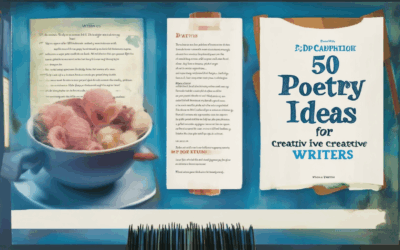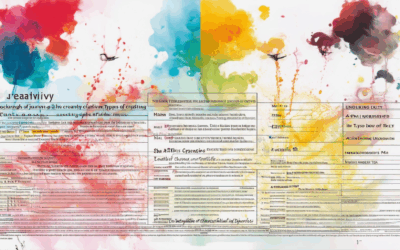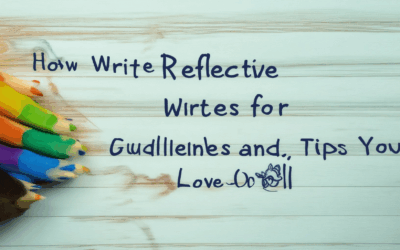Discover how literary prompts can ignite your poetry writing and unlock endless creativity. Whether you’re a seasoned poet or just beginning, finding the right prompts can transform your approach and inspire fresh ideas. From overcoming writer’s block to exploring unique themes, literary prompts offer a structured yet flexible way to spark imagination. Explore various poetic forms, delve into meaningful topics, and discover techniques to craft compelling beginnings. Learn how to harness the power of prompts to elevate your poetry and bring your ideas to life. With a wealth of options available, there’s no better time to embark on your poetic journey.
Key Takeaways
- Discover Inspiration: Explore nature, personal experiences, and daily moments to spark creativity and fuel your poetry.
- Experiment with Forms: Try haiku, sonnets, or free verse to expand your creative boundaries.
- Read Widely and Curiously: Engage with diverse literature, films, and music to enrich your writing.
- Journal Regularly: Keep a notebook to jot down ideas and notice patterns in your thinking.
- Collaborate and Share: Join writing groups for feedback and fresh perspectives.
- Write Daily: Establish a consistent routine to maintain and grow your creativity.
- Engage in Creative Activities: Try painting, dancing, or cooking to stimulate your senses and find inspiration.
- Choose Meaningful Themes: Select topics that resonate personally or universally, like love or nature.
- Use Sensory Details: Include sensory elements to create vivid and immersive poetry.
- Reflect on Life Experiences: Draw from personal history and heritage to add depth to your poetry.
- Stay Curious and Connected: Observe everyday moments and engage with your community for inspiration.
- Write as Therapy: Channel emotions through writing to process life and create heartfelt poetry.

What Are Poetry Prompts?
Poetry prompts are creative writing tools designed to inspire and guide writers to produce original works. These prompts encourage exploration of themes, imagery, and emotions, serving as a catalyst for generating ideas and sparking innovation.
Types of Poetry Prompts
- Generative Prompts: These are open-ended questions that invite creative responses. Examples include “Write a poem about a magical forest” or “Describe a moment of courage.”
- Thematic Prompts: These focus on specific themes or concepts. Examples might be “Explore the concept of love” or “Describe a journey through time.”
- Situational Prompts: These place the writer in a particular scenario. Examples could be “Write a poem from the perspective of a cat” or “Imagine yourself standing on a cliff overlooking the ocean.”
How to Use Poetry Prompts Effectively
- Start with a Theme: Choose a theme or idea that resonates with you. Use the prompt as a springboard to delve deeper.
- Experiment with Forms: Try different poetic forms like haiku, sonnet, or free verse to challenge yourself creatively.
- Let the Prompt Evolve: Don’t feel constrained by the exact wording. Allow the prompt to inspire and morph into something unique to your style.
- Use Them Regularly: Prompts are excellent tools for overcoming writer’s block and fostering consistency in your creative practice.
Poetry prompts are a valuable resource for anyone looking to unlock their creative potential and explore new dimensions of their craft. Whether you’re a seasoned poet or just beginning, prompts provide a fun and accessible way to spark inspiration and dive into the world of poetry.
Which Topic is Best for Poetry?
1. Personal Experiences
Poetry often benefits from personal reflection, allowing writers to express emotions and thoughts that might otherwise go unnoticed. Writing about a significant life event or feeling can create a deeply connective experience for both the writer and the reader. For instance, reflecting on a moment of loss or triumph can transform raw emotions into powerful verse. Explore how personal narratives inspire poetry on Silken Drum .
2. Nature and Environment
Nature serves as a timeless muse for poets, offering vast imagery and emotional depth. Topics like seasons, weather, or natural phenomena can evoke strong feelings and provide a foundation for metaphorical expression. Consider the beauty of autumn leaves or the serenity of a mountain stream as prompts for poetic creation. Discover nature-inspired poetry ideas on Silken Drum .
3. Historical or Cultural Themes
Delving into history or culture allows poets to tap into rich tapestries of human experience. Whether retelling ancient myths, exploring historical events, or examining cultural traditions, these themes provide abundant material for storytelling and reflection. For example, the legend of Persephone bridges myth and seasonality, making it a compelling topic. Learn more about cultural influences on poetry on Silken Drum .
4. Social Issues and Advocacy
Poetry can be a powerful tool for social change, offering a platform to address inequality, injustice, or societal challenges. Writing about contemporary issues can make poetry relevant and impactful, fostering empathy and awareness among readers. This approach aligns poetry with activism, creating a lasting legacy. Find resources for socially conscious poetry on Silken Drum .
5. Creative Challenges
Engaging in structured poetic forms or challenges can stimulate creativity and innovation. Formats like haikus or sonnets impose constraints that can lead to breakthroughs in expression. These exercises encourage poets to experiment with language and imagery, resulting in diverse and compelling works. Explore creative poetry challenges on Silken Drum .
6. Seasonal and Thematic Cycles
Seasons and thematic cycles provide recurring motifs that inspire repetition and variation. Topics like spring’s rebirth or winter’s stillness can be revisited annually, allowing for evolution in perspective and style. This cyclical approach keeps poetry fresh and dynamic. Discover seasonal poetry inspiration on Silken Drum .
7. Abstract Concepts
Exploring abstract concepts like love, time, or existence invites deep philosophical inquiry. These topics allow poets to transcend literalism, embracing the intangible to create meaning and beauty. The complexity of such themes can challenge readers to reflect on their own interpretations. Read about abstract poetry on Silken Drum .
8. Everyday Moments
Even the ordinary can become extraordinary through poetic observation. Capturing the essence of a simple act or scene can reveal hidden beauty and significance. This approach democratizes poetry, making it accessible to everyone who takes the time to notice the world around them. Find tips for observing everyday moments in poetry on Silken Drum .

What is a good poem starter?
A good poem starter is a line or phrase that effectively engages the reader and sets the tone for the rest of the poem. Here are some thoughtfully crafted starters that can inspire your creative journey:
- “Under the moonlit sky, whispers of the unknown echo softly…“
- “Where the sea meets the sand, a story begins to unfold…“
- “In the quiet of the morning, before the world awakens, I find peace…“
- “Through the misty valleys and towering peaks, a path awaits…“
- “When shadows stretch long and stars begin to gleam, thoughts take shape…“
- “The rustle of leaves, the murmur of streams, a symphony of nature…“
- “Within the chaos, there lies a calm, a silent song…“
- “As dawn breaks over the horizon, a new day dawns…“
- “The clock strikes midnight, and with it, a new adventure…“
- “Among the stars, I find my place, where stories are born…“
These starters are designed to evoke imagery, emotion, and curiosity, guiding the reader into the world of your creation. Whether you prefer the tranquility of nature, the mystique of night, or the serenity of dawn, let these lines be your gateway to poetic expression.
Silken Drum encourages you to explore these starters and let your imagination flow. Visit us at Silken Drum to discover more resources for writers and poets.

How to Find Inspiration for a Poem
Writing a poem can sometimes feel like staring at a blank page, but with the right approach, you can unlock your creative potential. Here are some effective ways to find inspiration for your next poem:
- Explore Nature : Step outside and immerse yourself in the world around you. Observing the beauty of nature, whether it’s a blooming flower, a serene lake, or a bustling city street, can spark vivid imagery and emotions that translate well into poetry.
- Embrace Personal Experiences : Reflect on meaningful moments in your life. A memory, a feeling, or a challenge you’ve faced can be the perfect foundation for a poem. Consider how these experiences have shaped you and what lessons they might teach.
- Experiment with Forms : Try different poetic structures like haiku, sonnet, or free verse. Exploring various forms can push your creativity and help you discover new ways to express your thoughts.
- Set a Daily Practice : Dedicate time each day to write. Even if it’s just a few lines, consistency helps build momentum and keeps your creative muscles active. Over time, you’ll find it easier to tap into inspiration.
- Seek Diversity of Influences : Read widely, watch thought-provoking films, listen to diverse music, and engage with different cultures. The more exposure you have, the richer your creative palette becomes.
- Collaborate with Others : Join writing groups or workshops to gain feedback and exchange ideas. The energy and perspectives of others can reignite your own passion and provide fresh directions.
- Journal Your Thoughts : Keep a writer’s notebook to jot down observations, ideas, and fragments of thoughts. Over time, this habit can reveal patterns and themes that are perfect for poetry.
- Engage Creatively : Try something unexpected, like painting, dancing, or cooking. These activities can stimulate your senses and bring new perspectives to your writing.
- Reflect on Daily Moments : Pay attention to the small, everyday moments that often go unnoticed. These can be the most profound sources of inspiration, offering unique insights into human experience.
Remember, inspiration doesn’t have to come from grandiose experiences. Sometimes, it’s found in the ordinary details of life. With patience and curiosity, you’ll discover endless possibilities for crafting meaningful poetry.
How to Choose a Poem Topic
Choosing a poem topic can feel overwhelming, but it doesn’t have to be. Start by reflecting on what inspires you. Whether it’s a personal memory, a vivid dream, or something you’ve read, let these experiences guide your choice.
Consider the following steps to find the perfect poem topic:
- Reflect on Personal Experiences: Think about moments in your life that stand out. These memories often make for rich material. As you recount them, you’ll discover new angles and emotions to explore.
- Explore Universal Themes: Topics like love, loss, nature, or identity are timeless. These themes resonate with many readers and can give your poetry broader appeal.
- Experiment with Forms: Try different structures like haiku, sonnet, or free verse. Each form has its own requirements and can inspire unique ideas.
- Use sensory details: Describe what you see, hear, smell, taste, or touch. This helps bring your poem to life and creates vivid imagery for readers.
- Stay curious: Read widely and pay attention to the world around you. Observing everyday moments can lead to unexpected inspiration.
Remember, there’s no right or wrong topic—what matters most is your genuine connection to the subject. Write from your heart, and your passion will shine through.
For more resources and community support, visit Silken Drum and explore our poetry workshops and forums.

Where Do Poets Find Inspiration?
Poets draw inspiration from a diverse array of sources, each contributing uniquely to their creative process. Here are some primary avenues:
- Nature : Many poets are captivated by the beauty and wonder of the natural world. The imagery of mountains, rivers, forests, and seasons often serves as a muse, influencing themes of harmony, growth, and transformation. Writers like William Wordsworth and Robert Frost found endless inspiration in the outdoors.
- Personal Experiences : Emotions and life events are significant catalysts for poetic expression. Poets often channel their feelings, memories, and reactions to everyday occurrences into verse, creating deeply personal and relatable works.
- Daily Observations : The smallest details can spark inspiration. Whether it’s a sunrise, a child playing, or a moment of silence, these fleeting observations can ignite a poem’s essence, often captured through metaphorical language.
- Literature and Art : Reading works by fellow writers and artists exposes poets to diverse styles and themes, inspiring fresh perspectives and techniques. The interplay between different artistic forms can lead to innovative poetic expressions.
- Personal History and Heritage : Drawing from one’s background, family stories, and cultural roots provides rich material. These narratives carry emotional weight and cultural significance, fostering relatable and meaningful poetry.
- Community and Causes : Engaging with communities and advocating for causes allows poets to address societal issues and personal struggles, creating impactful poetry with a broader purpose.
- Writing as Therapy : The act of writing itself can be therapeutic, helping poets process emotions and reflect on their lives. This introspective practice often leads to heartfelt and authentic poetry.
In summary, poets find inspiration in the natural world, personal experiences, daily moments, literary influences, historical contexts, community ties, and the creative process itself, crafting poetry that resonates deeply with readers.




0 Comments